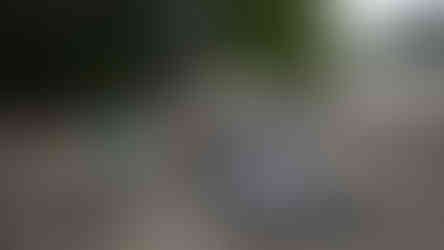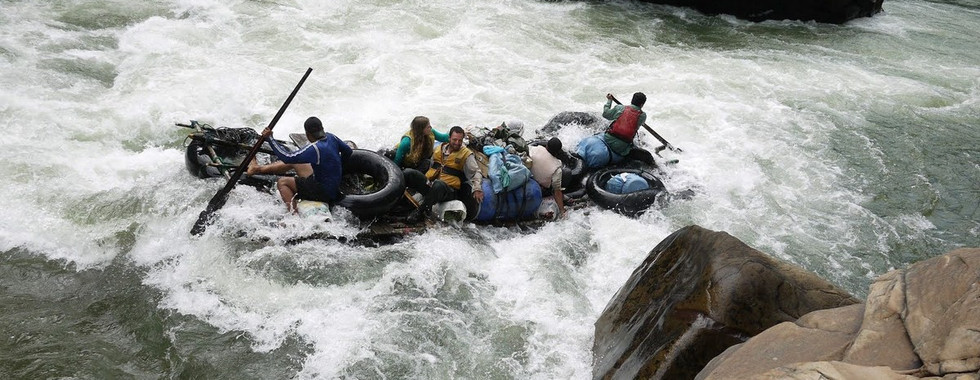Of all nationality of travellers I met in Bolivia, the most numerous were Israelis. Usually travelling in a crowd and often knowing the best places to go, I spent a memorable 10 days rafting with a group of them. The trip was organised by another Israeli who’d married a local woman and stayed, and now organised low-cost trips for his demanding countrymen. They were billed as Expeditions rather than tours as the route and itinerary were flexible and dependant on local conditions. We were heading inland to the River Tuichi where we’d make a raft and spend a week or so floating downstream through primary forest, navigating rapids, living off the river, camping on the banks and exploring side waterfalls.
Although I hadn’t realised at the time, the river had been made infamous by another Israeli, Yossi Ghinsberg. A few years earlier he'd been on a similar trip but after splitting off from his group and a subsequent rafting accident, he’d ended up alone in the jungle for several weeks, only just managing to survive. His story has been made into a film starring Daniel Radcliffe.
Fortunately, my fellow travellers were the best of companions; capable, interesting and easy going, and we were all in the experienced hands of two locals, Waldo and his apprentice, Jacob. Except for Waldo everyone was less than half my age.

Travel in Bolivia is mostly by coach. The quality and comfort of the vehicle reflects the scale and importance of the route. Major arteries are plied by modern, spacious coaches with hydraulic suspension which smooths out the rutted roads, and all the baggage is stored in vast subterranean holds. By contrast, we were going to a small, remote town some 16 hours inland from the capital, La Paz. Our coach was old, battered, uncomfortable and packed, with a chaotic assortment of tattered boxes and paper-thin canvas bags strapped to the roof.
Leaving La Paz we weaved through roadblocks manned by local people taking direct action, a popular form of protest in Bolivia. The sky was luminous blue as you only get at altitude. We bounced along a high plain on an unpaved road, through isolated and bleak villages with their ancient mud brick buildings and newer schools made from concrete, and on towards snow-capped mountains shimmering in the blinding brightness of the sun. At one small village a man got on, stood in the aisle, and with a calm voice started preaching a simple message of how we’d all been let down by the government but not by God who was there, waiting, ready to embrace. People looked on blankly and, I thought, without interest, but when he finished, he handed round his CD’s and many were bought. In a deeply Catholic country with governments changing more often than virtually any other country, the church is seen as stable and trusted, and has increasingly taken on social issues.
As we left the plain and dropped into the jungle, I fell asleep. I woke to the sound of wheels spinning. It was dusk and the road had turned into sticky clay. We were asked to get out so the lightened coach could take a run up to get through. It worked and was later repeated until the third time when we got stuck fast. The driver then attached a long rope to the coach. Casually, as if this was just another part of the journey, we all got out, planted ourselves in the deep mud, heaved and pulled it free.
Early the next morning we arrived at our destination, a small town in the jungle. We bought provisions and machetes for the trip, and a couple of live chickens for dinner, before heading off on a much worse track in the back of a 4x4 on top of tyres, gas cylinders and all our bags. The road was so deeply rutted and the vehicle so top heavy with us in the back, that to stop it from rolling as we lurched from side to side we’d lean out in the opposite direction, like we were in a sailboat.

By dusk we arrived on the Tuichi riverbank.
We quickly collected wood, and then killed, prepared and cooked the chickens on a spit over the fire. As we ate, we looked out on the moonlit river and the hills beyond.

The next morning, we woke to a light rain and over the smoking fire Waldo cooked up a breakfast of shakshuka, an Israeli staple of baked eggs in a spicy tomato sauce.
Waldo was middle aged and throughout wore the same pale green open neck shirt and old, dark grey work trousers. But for his lack of footwear, he could have passed as an accountant. He had a quiet, deliberate manner and whether using the machete, steering the boat, gutting a fish, or kneading bread, his movements were efficient and expert. He had been brought up on the river and had a lifetime of experience. He was supported by his apprentice Jacob, the ‘muscle’, half his age but already very capable. Together they formed a powerful engine with the rest of us willing helpers and eager learners.
We set to work making the raft by cutting down thin trees and tightly lashing them together to form a large rectangular frame, and then infilling with more lengths to form a platform. The trees were strong and super flexible, perfect for negotiating rough water. We then inflated ten huge tractor inner tubes and firmly secured these to the platform. And that was it, the raft was complete. Our bags were stowed in a few battered plastic drums and some ancient drybags, which looked like waxed sheep bladders, and were stacked in the middle of the raft, doubling as seats and cushions. Carefully we got on. Waldo and Jacob took the front and back respectively and with only their crudely fashioned paddles to steer us, we set off down the gentle river. Initially the Israelis and I were cautious moving around the raft, anxious to see whether our handywork was up to the task. It soon proved itself and from then on, we clambered around with speed and ease.

Initially shallow and slow flowing, as its tributaries joined the main channel, the Tuichi picked up speed. We had some extra inner tubes so we could take turns floating independently, bobbing on giant black doughnuts down the gentle rapids as we looked out on the dense forest rising above the thick, rich, chocolate brown river. There were monkeys, brightly coloured birds – mostly territorial who’d fly low at us to make sure we moved on - a tapir and maybe a fleeting glimpse of a puma. It was what, as a schoolboy, I’d thought of as the epitome of adventure.

Towards the end of the day, as the shadows extended and the colours intensified, we stopped to camp at a thin beach on a bend in the river surrounded by dense jungle and opposite a deep red sandstone outcrop.

Jacob was proving himself to be an excellent fisherman, and the Tuichi a generous host. With just a line and some bread he caught a decent size fish – probably 10kg – which he gutted, seasoned with salt and lemon and trussed between two halves of bamboo split longways. Cooked slowly over the fire and eaten with our hands, it was delicious. As we ate, we looked out onto the river lit up by the bright shadow of the full moon, until a gentle mist descended.
The next morning, by the time we’d finished our breakfast of porridge and freshly made flatbread, the mist had lifted. We left the raft and hiked into the dense jungle following a vague path between huge kapok trees with flared fin roots. We clambered over fallen trees and past hundreds of florescent butterflies supping on salty water seeping out of a cliff wall. We left the humidity at the river and it was cooler and insect free. The foliage was so dense that there was little light. Sound was muffled by the trees and the thick bed of decaying vegetation which created a feeling of detachment, and calm – like you get in a sound booth where there is no natural reverberation. Without a guide it would be easy to get lost.
We climbed onto a steep ridge hidden beneath trees with elegant leaves. In the distance was the sound of monkeys. Waldo made the noise of a baby and soon two monkeys came and watched us from a nearby tree.
Vines hung across a shallow gulley with a small stream. We tugged on them and then swung across. Buoyed, I tried another vine over a wider gap but this time it snapped, and I fell heavily onto the thick bed of leaves, to the amusement of the others.
After several hours we came to the end of the valley and to our destination, a 30m waterfall wrapped in foliage like a luxurious fur coat. We swam in the pool at its base and climbed a high ledge to get behind the waterfall. The sound was deafening and throbbing. The rhythmic sheets of falling water were hypnotic, like the gesture of a hand coaxing me forward, towards the edge.
Back on the river we rafted through our biggest and most treacherous set of rapids. They were so ferocious that only half of us could stay onboard, the rest had to clamber over the rocks around them. We all wanted to go so we drew straws. I was lucky. As we headed towards the rapids I looked up to see monkeys following us swinging from tree to tree, maybe the ones we’d seen earlier still looking for their young, or others thinking that we were mad.
As we hit the rapids we dropped over a huge boulder into the raging water. The raft flexed and the white water erupted between the wooden trunks like an exploding fire hydrant. For a moment we sank below the surface before stabilising. Waldo and Jacob paddled furiously to avoid a giant rock in the middle of the river. The raft twisted violently but held firm. All we could do was hang on. To go overboard in such rough water, days from the nearest road, would have been disastrous. It was an exhilarating ride, but over all too soon.
That night, after dinner of another giant fish, I lay watching the shooting stars through the orange glow of the fire, as they merged and danced with the bursting embers. Later we bathed in the inky darkness of the river watching a distant electrical storm. Flashes of white light lit up the mountains, followed by long delayed claps of thunder, but no rain.
There are a lot of bugs in the jungle but none more persistent and tiresome than the humble sandfly. On first encounter they seem harmless. They’re tiny and gentle when they touch you. But a little later when you start to feel itchy and look down on a mass of red spots which are their calling card, you see them for what they are - stealthy, sneaky, rash-inducing bastards. They were the bane of camp life. Unlike mosquitos whose buzz signals their presence, sandflies are silent. We needed to be eternally vigilant and the only ways to avoid them were to be:
1. engulfed in smoke from the fire,
2. behind a mosquito net or
3. generating a vortex of aerial turbulence by constantly waving our hands about like a demented drunk.
Nor did they have any respect for boundaries and going to the toilet was a perilous affair.
By contrast, ticks and leaches were more bearable and we all got into a routine of rigorous daily checks, and when found, repatriations to the forest floor.
After a breakfast of freshly made flat doughnuts and last night’s fish with rice we took to the river for my last day. It was much wider now and flowing at a sedate pace. We passed an illegal gold mining operation on a pebble beach; a crude affair of a handful of people, a smoky generator, a rickety conveyor belt, lots of water, piles of waste soil, and if they were lucky a tiny bag of gold.


We came to our first settlement in over a week, the isolated hamlet of San Jose. It’s a beautiful spot on the riverbank with a few dozen well-groomed thatched houses, a church, a village green, and even village stocks. But for the humidity we could have been back in England. I thought the stocks were just for effect, but later found out that they are still in use. In remote communities like this where there are no police, justice is metered locally, and the stocks are the preferred vehicle. These were painted with the words ‘el justiciero’, ‘the vigilante’. Recently the unsuspecting mayor of the area visited San Jose only to be seized and banged up for an hour or so for reneging on his promise of funding. Another example of local direct action, and a great way to get politicians to think twice about breaking their promises.
I’d decided to leave the group here and walk 35km through the jungle to the nearest town with a road. The others were staying on the raft for another few days but I’d tired of the river and, although I’d enjoyed being part of a group, it was time to get back to my own company.
I got some supplies from the village shop and was walking past a house with a father reading to his young daughters. They were about the same ages as my daughters and I glanced at the book and first recognised the colours of cover and then the title. I had been reading it to my daughters too. It was ‘The Diary of Anne Frank’. Here I was in the middle of the Bolivian jungle, in a remote village and we were connected by a common humanity. I don’t know why it was so surprising, but it was, and deeply moving.
I said farewell to my companions and we agreed to meet in La Paz. I was leaving late and would be walking in the dark. Although my pack was heavy – loaded up with water and a wet tent – it was good to be on my own, heading once more into the unknown, and a new adventure.
The route followed a series of rough tractor trails through the mountains – in places deeply rutted with wide pools of liquid mud after the recent rains. As I set out just before dusk I met a few people on their way back to the village from a day of farming or woodcutting, all with their machetes resting on their shoulders like shotguns.
After a couple of hours, I stopped at a lake. It was dark but the moon was up. The smooth inky blue water was broken by the cloud reflections and framed by the silhouette of trees. I brewed a coffee and drunk in the darkness and the sky full of more stars than I had ever seen. I wrapped myself in this moment of beauty and isolation like a warm blanket.
I walked on by the light of my headlamp, listening to the Rolling Stones, as large bats flew around me. After some time, the spell of the night was broken by the sound of a sawmill and the weak light from a small logging station. I stopped to ask directions. They were surprised to see someone walking at night and encouraged me to stay till morning. When I refused, they quietly enlisted the powers of the saints to look over me.
By the time I approached the town I was exhausted. I thought I must be delirious too as above the trees fireworks were exploding, and the jungle was throbbing to the beating of drums and the shrill sound of brass. It was the Corpus Christi fiesta, the annual celebration of the Catholic belief that the bread and wine of the Eucharist is the actual body and blood of Christ. The whole village was out, and now well lubricated with alcohol. The village band was swaying as it marched to the square. I watched for a while and then found a small shop and celebrated my own Eucharist with a reviving can of coke, my first cold drink in ten days. The shop was a simple wooden structure, just one small, dimly lit room and run by a mother and her teenage son. We sat on the bench of their wooden veranda and chatted. They were curious to see my camping equipment and so I made them a coffee and showed them photos of my family and the trip. Such friendly people with calm, bright eyes. It was late but I had nowhere to go and they offered me the bench. I gladly accepted. I smelt of days of fire smoke and sweat and was caked in mud. But in my exhaustion, the bench felt just fine, and better still there were no sandflies. The fiesta was dispersing, and as I slipped into sleep a group of men, dressed as winged angels, were staggering along the road in front of me, a little worse for wear.












































Comments